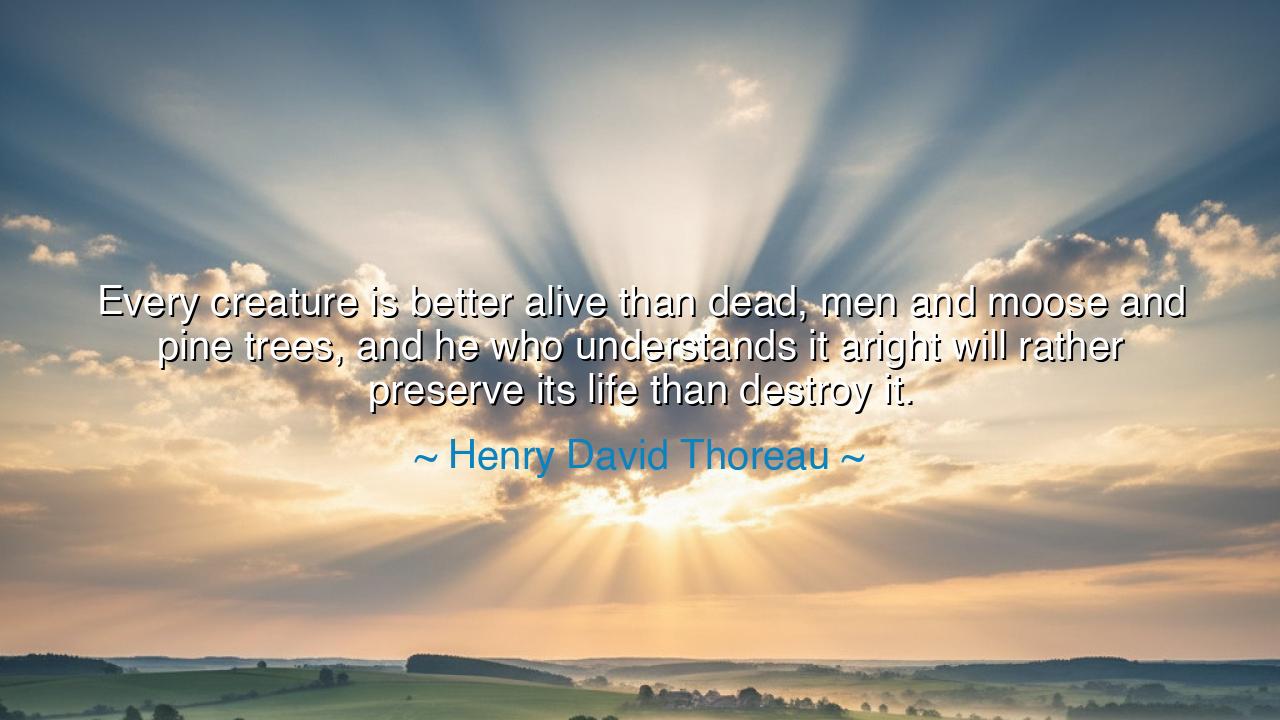
Every creature is better alive than dead, men and moose and pine
Every creature is better alive than dead, men and moose and pine trees, and he who understands it aright will rather preserve its life than destroy it.






“Every creature is better alive than dead, men and moose and pine trees, and he who understands it aright will rather preserve its life than destroy it.” Thus spoke Henry David Thoreau, a man whose heart beat in rhythm with the wild pulse of nature. In this single utterance, the sage of Walden Pond captured the eternal law that binds man, beast, and forest: that life itself is sacred, and the destruction of life for vain or fleeting purposes is an offense against the living universe. His words echo not merely as moral counsel, but as a song of remembrance—a hymn to the unity of all breathing things beneath the heavens.
From the dawn of creation, the ancients understood what modern man has forgotten: that every being, from the crawling worm to the towering pine, carries within it a spark of the same divine fire. The moose roaming through the fog-laden woods, the pine tree whispering in the wind, and the man who beholds them—all are but different forms of one great spirit. Thoreau’s words awaken us to this truth: that to harm one is to diminish the harmony of all. To destroy what lives for the sake of greed or indifference is to strike at the very fabric of our own soul.
Consider the tale of John Muir, the wanderer of the American wilderness, who once stood before a roaring waterfall in Yosemite and wept—not for sorrow, but for reverence. He saw in the thunder of the water the living breath of the Earth, and he fought, as Thoreau had before him, to shield those sacred valleys from the blade and the axe. Because of men like Muir, who understood aright the wisdom of preservation, vast forests and mountains remain to this day—living temples of the divine, where generations may yet wander and learn humility.
There is a quiet heroism in preservation. It is not the glory of conquest or the pride of possession, but the strength to let life be, unshackled and free. The hunter may take pride in his skill, and the builder in his creation, but greater still is the man who spares when he could destroy—who sees the trembling leaf and chooses wonder over dominion. In this act lies the highest power: the mastery of the self.
For in truth, to preserve is to love, and love is the highest commandment of life. When we love the living world, we find ourselves reflected in it. The forest becomes our brother, the river our teacher, the bird our fellow traveler. We learn patience from the trees, courage from the beasts, and serenity from the waters that never cease their song. Such love humbles the heart and strengthens the spirit, guiding man back to his rightful place as steward, not ruler, of the Earth.
Yet look upon the world today, and see how easily men forget this sacred bond. Forests fall to the hunger of machines, rivers are choked with the remnants of man’s haste, and the cries of the wild grow fainter each year. We must remember Thoreau’s call—not as a whisper of the past, but as a command for the present. Every creature that lives adds its voice to the symphony of existence. To silence even one note is to lessen the whole.
Therefore, let each man and woman take up this charge: to preserve rather than destroy, to behold life not as a resource but as a revelation. Plant a tree where one has fallen; let the birds find refuge in your garden; speak softly in the woods, as if entering a holy place. Teach your children to marvel at the ant as much as the eagle. For when humanity learns again to honor the living, it will rediscover the peace it has long sought and seldom found.
Thus, as Thoreau reminds us, life itself is the holiest of treasures. To understand it aright is to stand in awe before all that breathes, and to guard it as one guards the flame of the heart. This is not merely wisdom—it is salvation. For he who preserves life preserves himself, and he who destroys it, though he live a thousand years, shall never truly live at all.






AAdministratorAdministrator
Welcome, honored guests. Please leave a comment, we will respond soon